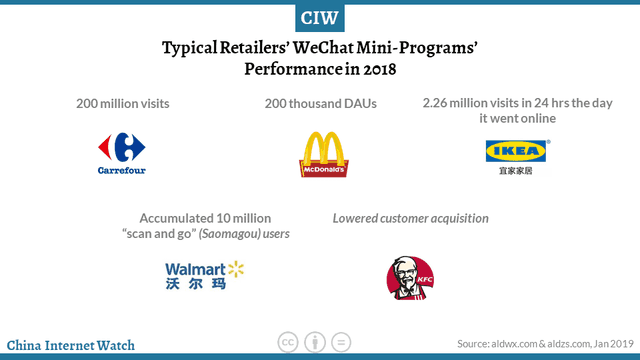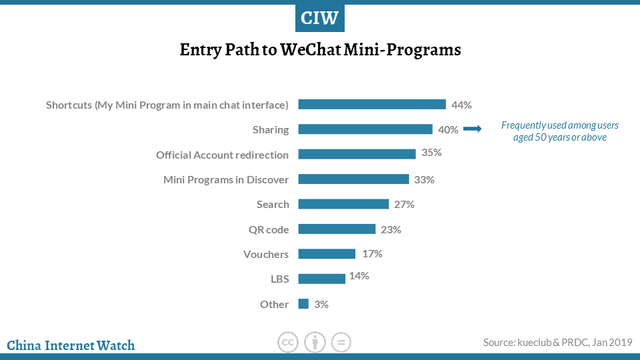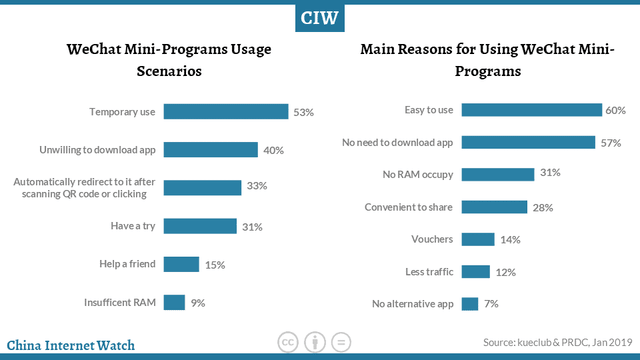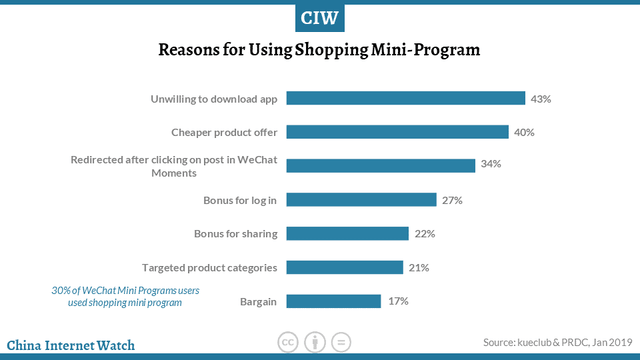
The launch of Mini-Game “Jump” (Tiaoyitiao) made WeChat Mini-Programs (or WeChat Apps) an instant hit in early 2018. On average, 230 million users used WeChat Mini-Programs daily, 60 million more than 2017. It is estimated to exceed 350 million by the end of 2019.
Read the latest insights on WeChat apps and mini programs here.
WeChat’s Mini-Programs has covered over more than 200 industries and provided over 100 billion times of requests. The sector of public services has been available among 362 prefecture-level cities and created over 500 billion commercial value. The total transactions were 600% more than a year ago.

At the end of 2018, over 2.3 million WeChat Mini-Programs has gone online since its launch in January 2017, which increased by nearly 300% from early 580 thousand.
In terms of the total number of applications, WeChat took less than two years to surpass Apple’s App Store, which held 2.1 million apps with ten years. Aldwx.com’s Mini-Programs data statistics platform forecasts the total mini-apps on WeChat will surpass 5 million by the end of 2019.
It is becoming more and more difficult for a mini-programs to get enlisted in the top 100 ranking on WeChat.
Tongcheng-eLong and Pinduoduo took the first two spots in December 2018. 34% of the top 100 mini-programs turned out to be newcomers. On average, 30% of the top 100 would be replaced by new ones every month in 2018.
All WeChat mini-programs attracted more than 8 billion yuan (US$1.19 billion) from 110 funding rounds led by 120 investment agencies. The figure was eight times higher than it was in 2017.

Offline retail and online shopping mini-programs were the two most popular areas, which together accounted for nearly 70% of total funding.
9 Brands see great results from WeChat Mini Program live streaming campaigns
The advertising market of WeChat Mini-Programs is projected to grow from 5 billion yuan in 2018 to 20 billion yuan by 2019. The retail transactions made with WeChat ecosystem is to exceed 3 trillion yuan by 2019.

Following the launch of Nearby Mini-Programs feature, some leading retailers have successfully connected online marketing scenarios with offline. For example, IKEA WeChat Mini-Program saw 2.26 million visits in 24 hours on the day it went online.
On average, each user accesses WeChat Mini-Programs 4.25 times a day and spends 8.7 minutes on it. WeChat Mini-Programs has seen 600 million users as of the end of 2018. 72% of WeChat users have used WeChat Mini-Programs; 34% of whom used it frequently.
Business guide to WeChat Mini Program live streaming
WeChat Apps Usage Scenarios
53% of users use WeChat Mini-Programs mainly for temporary usage, 40% didn’t want to download mobile apps, 33% are automatically redirected to it after scanning QR code or clicking, and 31% just want to give a try.
User profile & usage preference
Among WeChat Mini-Programs users, 58% were men, 70% under 40 years old, 76% college educated or above, and 52% lived in tier-3 or lower tier cities.
42% of users played Mini-Games on WeChat, 39% used lifestyle services mini-programs, and 28% viewed news.
Specifically, those aged 17 years or younger mainly used WeChat Mini-Games. Users between 18 and 49 years old like to use Mini-Games and lifestyle service mini-programs. And, older users over 50 years old prefer news mini-programs, such as People’s Daily, and lifestyle service mini-programs.

Out of the 69 entry paths to access WeChat Mini-Programs, chatting, sharing, search, QR code, and shortcuts are most frequently used.
44% of users chose shortcuts from My Mini-Program in the main chat interface, 40% accessed from friends’ sharing (especially preferred by older users), and 35% entered through Official Account redirection.
Usage scenarios

53% of users use WeChat Mini-Programs mainly for temporary usage, 40% didn’t want to download mobile apps, 33% are automatically redirected to it after scanning QR code or clicking, and 31% just want to give a try.
Mini Program platforms in China: WeChat vs. Alibaba vs. Baidu
In the eyes of users, what makes WeChat Mini-Programs attractive is its ease to use (60%), no need to download apps (57%), no RAM usage (31%), and convenience to share with friends (28%).
71% of users have shared Mini-Programs to others because they deem it valuable (57%), they were asked by friends (22%), or attracted by rewards (15%).
56% shared practical tools for office collaboration, 48% shared interesting contents to create topics and enhance interactions, and 32% shared Mini-Games to show gaming advancement, earn red envelops, or invite someone to compete against themselves, etc.

30% of WeChat users have used Mini-Programs to shop. 43% of them are willing to download apps, 40% found the product offer was cheaper, and 34% were redirected from posts on WeChat Moments.
However, some program designs affect users’ experience while shopping, such as profit-provoking shares and useless vouchers.
Users’ impressions on WeChat Mini-Programs
For those not using WeChat Mini-Programs, 30% found it not easy to find the one they want as many users mainly get access from friends’ sharing. 25% found the interface choppy especially when they played Mini-Games. And, 23% are worried about a specific function because it seems only useful for temporary usage.
Overall, users hold positive impressions toward WeChat Mini-Programs. 44% of users thought Mini-Programs could replace apps for occasional usage, 36% believed it could help save the smartphone storage, and 32% only viewed it as a tool.
40% of users expect WeChat Mini-Programs to improve the interface switching fluency between chat and mini-programs. 37% expect more useful mini-programs. And, 37% wish it more active in interactions.
One-third of users are willing to download the app after they have a try with a mini-programs. However, most of the users are primarily provoked by profits to download the app.
WeChat’s new social e-commerce platform integrates Shopping Accounts